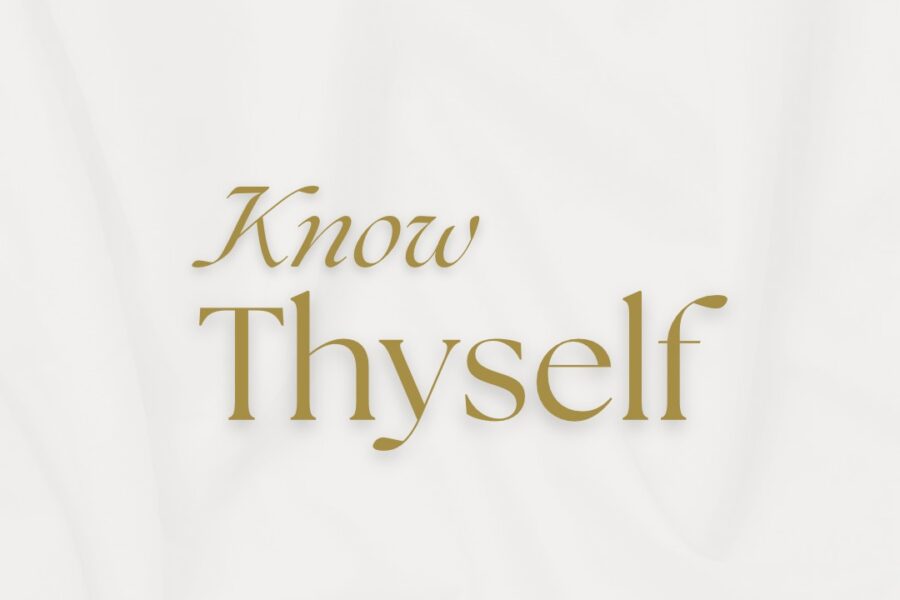Jay Blogs – Know Thyself

I currently teach in a program called the Van Lunen Fellowship, based out of Calvin University in Grand Rapids. The program is for executive leadership training, designed for new heads of school who have recently entered into the position, perhaps from being a teacher, or principal, or some other role, but who don’t have all the skills they need for the head job. The program teaches people to work with a school board, to manage a school budget, to raise money, to develop and building culture, and to serve as the pastoral leader of the school, among other topics. But, Van Lunen doesn’t just teach skills. If it did, it would be incomplete. One of the greatest things new heads in the program learn is greater self-awareness.
The wisdom of knowing oneself is as ancient as mankind. Aristotle famously said, “knowing thyself is the beginning of wisdom.” From that day until the present, being self-aware is a critical skill not only for leaders, but for all of us.
Self-awareness is critical to emotional intelligence. Emotional intelligence (EQ) is generally thought of as the cluster of abilities that allow us to discern and regulate emotions in ourselves and in others. Studies show it accounts for 58 percent of performance in all types of jobs, trumping IQ, personality, education, experience, and gifts. Some are stronger in EQ than others, but it is generally believed that one can grow in EQ. But you have to be self-aware to be emotionally intelligent. In the most widely-regarded theories on EQ, self-awareness is the foundational component. You have to be self-aware to self-regulate. And, the other social abilities are useless if you lack the awareness of when or how to use them.
Here’s what’s even more critical, and goes to the root of who you are: The goal of the spiritual journey as a follower of Jesus Christ is the transformation of self. (Romans 12:2). This transformation requires knowing both yourself and God. I am reading The Gift of Being Yourself: The Sacred Call of Self-Discovery by David Benner. Benner notes that one has to know both God and self if one is ever going to discover his or her true identity in Christ. This is so because you- your self– is where you meet God. Knowing both yourself and God are necessary if you’re going to live out the uniqueness of God’s calling on your life. While self-exploration can certainly devolve into narcissism, when one’s heart is inclined toward understanding oneself as a way of knowing God and others better, it is a critical part of living in Christ. As John Calvin said, “Nearly the whole of sacred doctrine consists in these two parts: knowledge of God and of ourselves.”
The problem, of course, is that we humans have an uncanny tendency toward self-deception. We rationalize our own behavior and desires, creating false narratives, lying to ourselves to do what we want. Additionally, we cover our self with masks as strategies to avoid vulnerability and pain throughout the course of our lives, and yet, as Thomas Merton said, finding our unique, authentic self, behind the masks, is the problem on which all our existence, peace, and happiness depend.
Which is why studies show that, even though most of us believe we are among those who are self-aware, only 15 percent of us actually are. So, the odds are stacked against you being one of the 15 percent (and, if you’re like me, even now you’re rationalizing that you actually are one of the 15 percent—like I said, the uncanny tendency toward self-deception). The better part of wisdom is to assume the quest for self-awareness is one we’re all on, and that it’s necessary for our spiritual growth and transformation.
So, how do we become more self-aware? Self-awareness is a form of sanctification, and like all sanctification, it is a process that takes time, humility and a willingness to change, and the active work of the Holy Spirit in one’s life. There are some powerful tools in the process of becoming more self-aware.
There are multiple popular tools out there that are helpful to fostering self-awareness, including the DISC, Myers-Briggs, Culture Index, Enneagram, and others. Some are more reliable and researched-based, and each only shows us one small facet of the diamond that is the complexity of who we are as God’s image-bearers, but each can give some insight into personal strengths and weaknesses as we use them prayerfully and wisely.
There are other, deeper ways to expose ourself to the Holy Spirit’s work in our lives, increasing self-awareness. Here are a few which experts have identified, all of which are interrelated:
1. Create space and time– One of the main enemies of self-awareness is time and busyness. John Mark Comer said, “If the devil can’t make you sin, he’ll make you busy. Both sin and busyness have the same effect. They cut off your connection to God, to others, even to your own soul.”
Self-awareness requires reflection- taking the time to slow down, review our day and how we thought and felt about things, and why we felt that way. I’ve written before about the ancient daily practice of Examen- sitting at the end of the day and reviewing the day, reflecting on the ways and places God appeared in your life, what you thought and felt, and how you acted, where you may need to repent and seek forgiveness, and how God is in the process of transforming you. Examen is a great exercise.
Whether using Examen or not, carving out silence and solitude is a vital practice for self-awareness. The more time you spend in solitude and silence before the Lord, the more intentional and familiar you become with understanding your own thought patterns and emotions. Also, the more analytical and thoughtful you become about why you do what you do, the more you open your heart to the Holy Spirit for transformation. This is why Satan wants to distract us so much and often, because these things are so good for us, and he doesn’t want them.
2. Practice mindfulness toward yourself and to God– Mindfulness helps you be more aware of your thoughts and feelings. We spend so much of our lives just doing, not focusing on how we feel or what we think about what we do. This doesn’t mean we’re not thinking or feeling anything- we absolutely are. It just means that those things go “stealth” on us, and if we don’t take the time to unpack and deal with them in healthy ways, they can either build up and create unhealthy responses (such as angry outbursts, defensiveness, anxiety, or fear) that we really don’t understand, or they can create unnecessary stress we’ll carry without being aware of them. Over time, they can create personality or behavior issues that can undermine our dealings with others, to our harm and theirs.
3. Journal your awareness of what you hear– Writing things down creates space for you to identify, clarify, and accept your thoughts and feelings. It helps you discover what you want, what you value, and what works for you. It also allows time for the Lord to speak to you, and gives you the opportunity to record what he’s telling you.
4. Practice listening to others- One of the best ways to begin to listen to yourself, your own thoughts, feelings and emotions, is to begin by doing these things with others. We talk with people all the time, and we listen to what they’re saying. But, how often are we actively listening, seeking to truly understand what they’re thinking and feeling? Watching for their emotions and body language? Getting more in tune with others when we listen will not only help us understand and care for them better, but will make us better students of ourselves and heighten our self-awareness.
4. Seek out feedback– One of the most dangerous things about working and living with others are blind spots, those parts of ourselves that are hidden from us, but that others see all too well. Self-awareness can be a real challenge, because of our fallen proclivity to self-deception, to rationalize and convince ourselves that we’re good at something that we’re not good at, that we’re not bad at something we’re actually quite terrible at, or that we don’t have an issue with something when we clearly do. This is when having good and trusted colleagues, family, and friends come into play. The people who love you, who care about you, and who are on your team and want you to succeed probably have the courage to tell you things that may be hard for you to hear. But, you have to have the wisdom and courage to invite them to speak into your life, and the willingness to thank them for what they have to say, even when it may be hard for you to hear.
I once wrote about a great book by Paul Miller called The J-Curve: Dying and Rising with Jesus in Everyday Life. And, in it, Miller talks about the process of growing to become more like Jesus, the process of sanctification. He describes this process as a J-curve, whereby in our sin and brokenness we go down with Jesus, joining him in death, putting to death those things that inhibit us, that hold us back, even those things that are broken and that we don’t see or that are hidden. We bring those down into death with Jesus, where they are put to death. And, then we rise with Him, into resurrection, into victory, free of those things and the power they have on our lives, into newness and strength as a new creation through the power of the Holy Spirit.
We don’t just go through the J-curve once in our lives, but again and again: through trials, through challenges, through sufferings, and, yes, through the hard work of sanctification, of self-awareness, and confronting our shadow selves, of dying to the old self and being born anew, in the constant stage of becoming. And, as moms and dads, influencers, leaders and disciples, as we become more self-aware, so do the people we lead.
Jay Ferguson, Ph.D., Head of School at Grace Community School, writes regularly on his blog, JaysBlog.org.
